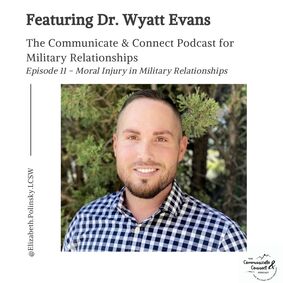IN THIS PODCAST
SUMMARY:
MAIN POINTS:
1. Who is Dr. Wyatt Evans:
Dr. Evens is a board certified psychologist at the Veterans Affairs Hospital, and has a private practice in Dallas - Fort Worth. He also teaches, writes, and conducts research on moral injury and resilience enhancement. His research uses an Acceptance and Commitment Therapy (ACT) perspective. ACT is an evidenced intervention for a full range of mental health and non-mental health issues. ACT has over 300 randomized control trials supporting it’s efficacy. ACT is a process based cognitive behavioral therapy that is built around a concept of psychological flexibility which covers topics such as enhancing acceptance, becoming more mindful, clarifying personal values, and living life based on those values. Acceptance and Commitment Therapy is all about accepting painful thoughts and feelings in order to go toward what’s really important in life” -- Elizabeth Polinsky
2. Three Definitions of Moral Injury:
It's an injury because its now preventing me from living my life” -- Elizabeth Polinsky
3. Moral Injury and The Military
Moral Injury is not exclusive to the military but is often discussed in a military context because combat situations often involve moral injury. Example: Killing a child in a combat scenario often causes moral pain. A service member might be ordered to kill a child; may encounter a child that has been weaponized and they are stuck between killing the child or allowing the child to put lives in danger; or times when targets are unclear and civilians get caught in the crossfire. To most people, these will cause moral pain—with emotions such as guilt, deep sadness, shame, as well as self-consuming thoughts like “what type of person am I?" or "what type of soldier am I?". These are actually adaptive because they prevent us from getting numb to these atrocities. But imagine that the service member comes home and they hear their kids squealing with happiness. They may start avoiding their child because they end up remembering the kids that were killed in the war scenario when they see their kids happy. They feel guilt from the original event, but now may also fell guilt from being distant from their kids--this causes disconnection from their values of caring, connecting, and protecting in there family. Now there is a perpetuated disconnection from their moral values. The values and the pain are two sides of the same coin... the fact that I feel guilt means my moral compass is still intact” - - Dr. Wyatt Evans
4. Other Causes of Moral Injury:
Caveat: There is some debate over what constitutes a morally injurious event. It usually takes place in a high stakes context where physical and psychological threat are significant.
Dr. Wyatt Evans and colleague wrote a workbook on moral injury that can be used by:
The workbook can be an aid in moral healing. The workbook has 3 parts: understanding moral injury and moral values; core ACT processes; and forgiveness, compassion for others, and self compassion.
6. Words of Wisdom from Dr. Wyatt Evans:
1) Encourage care—self care and professional care. Moral injury isn’t a mental health disorder, but it often does require extra support from a professional in the recovery and healing process. 2) Don’t collude with avoidance. Oftentimes partners and family members are attempting to be helpful in allowing avoidance of emotional pain, but it actually deprives the person of staying connected to their values. Stand next to them and with them in the emotional pain of the moral injury. 3) Invite and encourage connection. Moral injury is a social wound—a fraying of the fabric that connects us together. Invite them to stay connected and in touch with their moral values.
Working with Dr. Wyatt Evans:
Dr. Evans has a small private practice in the Dallas/ Fort Worth Area. For more information on working with him, see www.drwyattevans.com . Purchase The Moral Injury Workbook here!
Sign up for Liz's FREE Relationship Email Course!! Liz's Useful Links: Podcast Sponsor: The Relate Assessment is the most comprehensive relationship assessment in the world and is based on 10 predictors of marital stability. It’s supported by the American Association for Marriage and Family Therapy and is the one my husband and I used during our premarital couples counseling. To get 20% off the assessment, go to https://relateinstitute.com/ and enter “POLINSKY20”. Thanks for Listening! 
Elizabeth Polinsky is a marriage and couple therapist specializing in working with military members, veterans, and their families. Liz is located in Norfolk, Virginia, and provides online counseling services throughout Virginia, South Carolina, and Arkansas.
DISCLAIMER: My podcast, blogs, videos, newsletters, and products are general information for educational purposes only; they are not psychotherapy and not a replacement for therapy. The information provided does not constitute the formation of a therapist-patient relationship. You should consult your doctor or mental health provider regarding advice and support for your health and well being. I cannot answer questions regarding your specific situation. If you are experiencing a medical or mental health emergency, you should call 911, report to your local ER, or call the National Crisis Hotline at 1-800-273-8255. Nothing I post should be considered professional advice. The information in my podcast, blogs, videos, newsletters, and products are not intended to be therapy or psychological advice. The podcast, blogs, videos, newsletters, and products are not a request for a testimonial, rating, or endorsement from clients regarding counseling. If you are a current or former client/ patient, please remember that your comments may jeopardize your confidentiality. I will not “friend” or “follow” current or past clients to honor ethical boundaries and privacy; nor will I respond to comments or messages through social media or other platforms from current or past clients. Current and past client’s should only contact me through the professional contact information provided on the website. Lastly, accounts may be managed by multiple people. Therefore, comments and messages are monitored by staff and are not confidential. Comments are closed.
|
The Communicate & Connect Podcast
In Communicate & Connect For Military Relationships, I provide educational tips for relationships, communication, and navigating military family life. AuthorHey, I'm Dr. Elizabeth "Liz" Polinsky and I am a marriage counselor in Virginia Beach. I provide online counseling across the states of VA, MD, NC, SC, AR, and NV. Categories
All
|
Telephone(757) 354-1157
|
liz@communicateandconnectpodcast.com
|



 RSS Feed
RSS Feed
